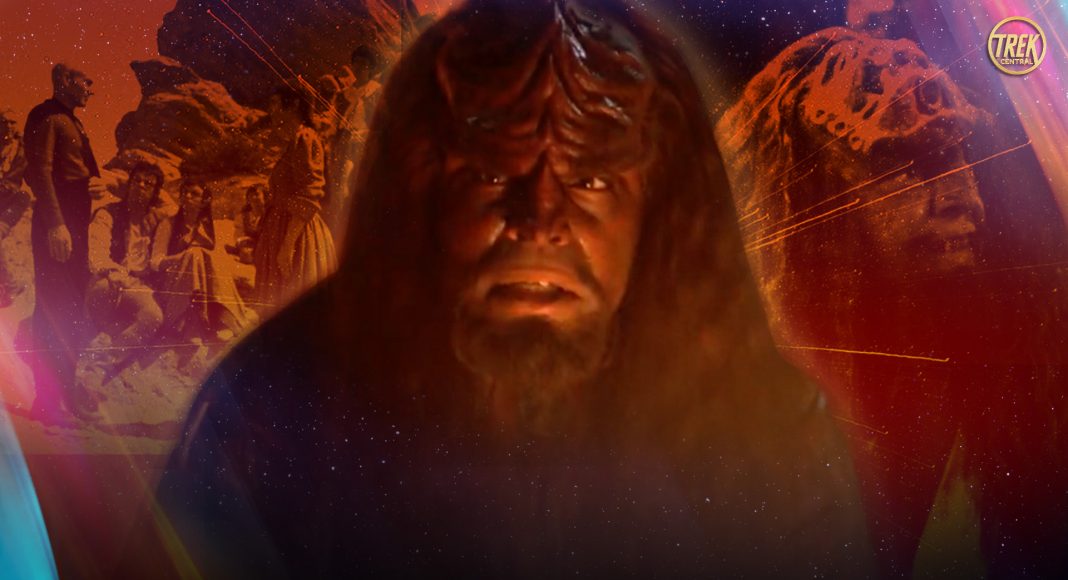Religion in Star Trek is equal parts inspiring and ambiguous. But first, “Religion” itself is a fairly loaded term for many people. Here this word and “faith” are a stand-in for organized belief systems that contain spiritual or animatistic properties. “Animatism” is a belief that all things are imbued with various kinds of dynamic forces; messily, even contemporary physics contains an element of this. Star Trek’s journey from Religion as a problem to a feature of a healthy society has been just as ambiguous at best.
Health and rejuvenation are ripe this time of year. Easter is an interesting time, it is a spiritual celebration of plenty and reproduction that was stamped over by a celebration of a Messiah rising from the dead. There is a strange symmetry in that. More still, the goddess whom Easter was named after was a resurrection goddess as well, a goddess of spring and renewal. Both deal in rituals of the afterlife. In case you’re interested we’ve previously discussed rituals in Star Trek.
More than any other species in Star Trek canon, the Klingon faith of Kahless and Sto-vo-kor come to mind with Easter. They also reflect many of our own interests in heroes, afterlives, and eternal life.
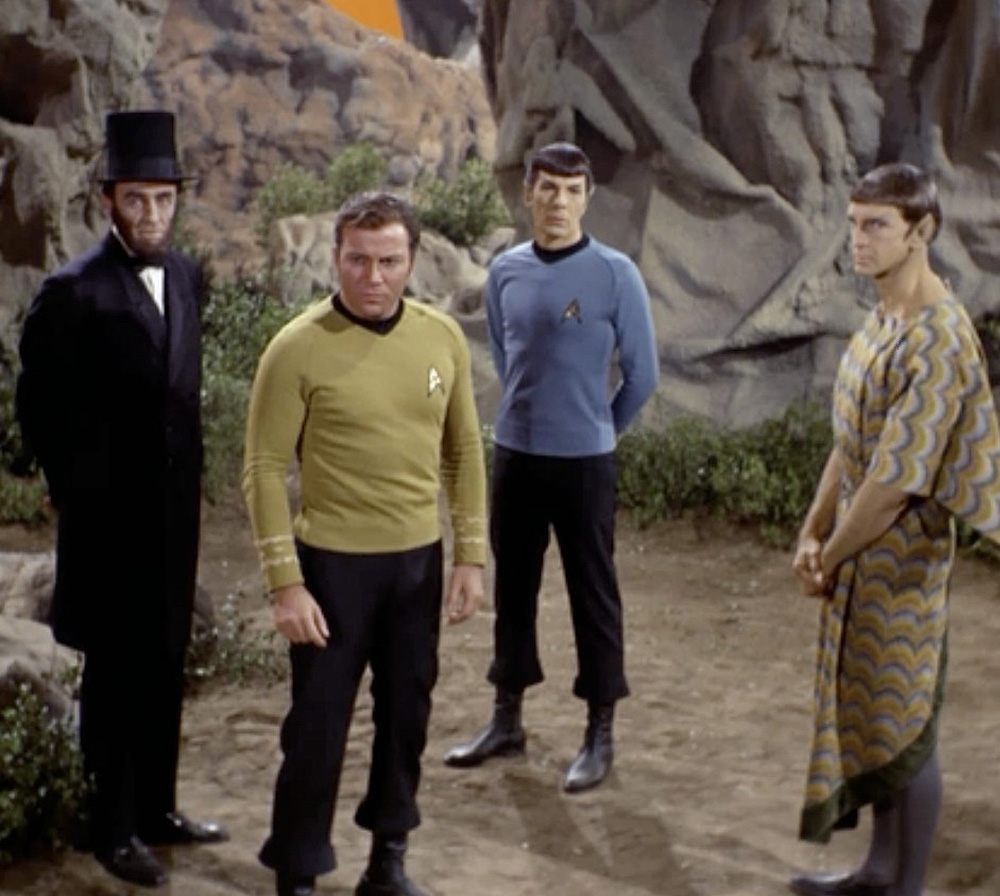
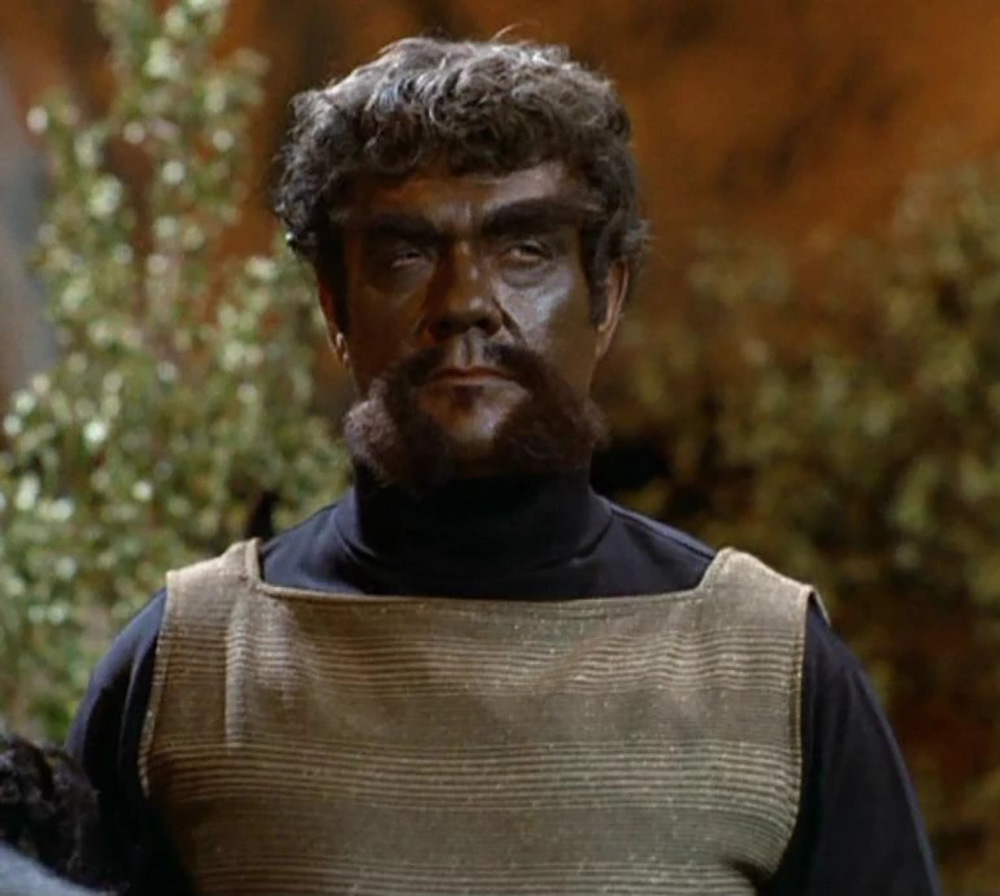
Messiahs, Afterlives, and Resurrections
Messiah are GOAT heroes who give their lives for a higher cause. Kahless certainly fits the bill. However, In his first appearance, he is an evil religious figure in Star Trek: The Original Series (TOS) episode “The Savage Curtain”. Kahless (Robert Herron) stands against Abraham Lincoln (Lee Burgere) and Suruk (Barry Atwater), philosophical figures. Trek’s ambiguous relationship with religion is on full display here. Canon today reinterprets this evil as human bigotry in the mind scan that created this Kahless.
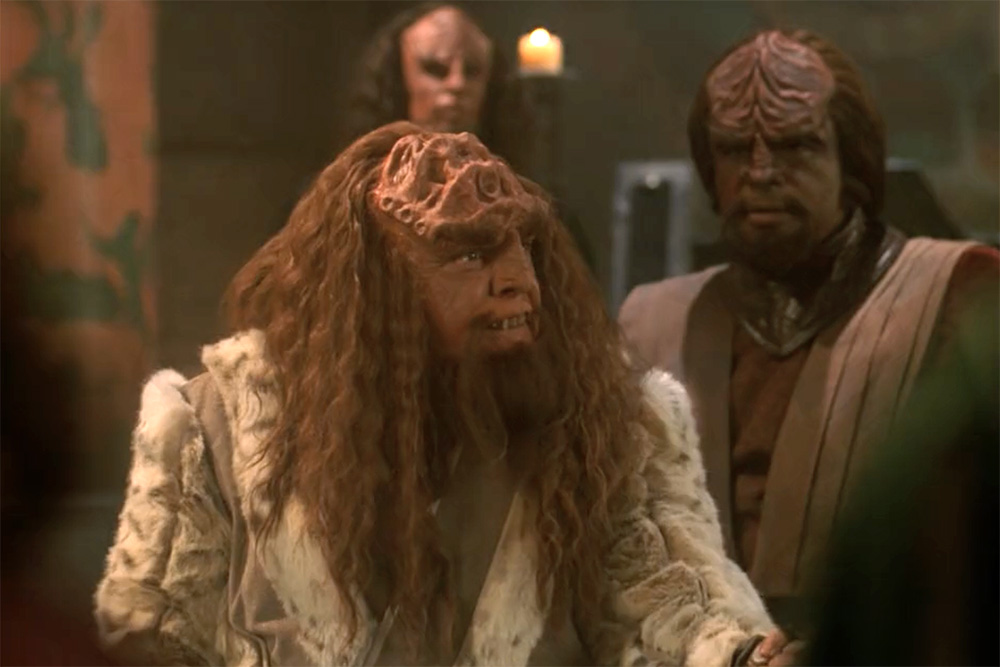
Kahless has obtained Viking-status while maintaining his position as gatekeeper to Sto-vo-kor; paradise eternal. But it is the other elements of his life that are revealed to us in Star Trek: Deep Space Nine’s (DS9) episode “Tacking Into the Wind” that matter. Worf (Michael Dorn) tells his patriarch, Martok (J.G. Hertzler), that he is the only honorable heir to the empire. He motivates Martok, of “low-birth”, by pointing out the same of Kahless. It is also Martok’s desire not to lead that, like Kahless, would make him fit to lead.
Kahless (Kevin Conway), or a version of him, resurrects in the Star Trek: The Next Generation (TNG) episode “Rightful Heir”. He is cloned from the blood of a ceremonial knife; programmed with religious texts and oral folk traditions. Eventually, he sees himself as a symbol. A narrative that represents Trek’s move towards religious rationalism.
Worf’s attempt to get Jadzia (Terry Farrel; murdered in the DS9 episode “Tears of the Prophets”) into Sto-vo-kor with inspirational acts is a similar rationalism (DS9‘s “Image in the Sand” & “Shadows and Symbols”). The only way to get in outside of dying honorably is to motivate an honorable act. A righteous act in the name of the dead. A possibly healthy and rational way to cope with loss.
Is Religion a Disease?
TNG‘s episode “Who Watches the Watchers” demonstrates Religion in Star Trek at its least ambiguous. Anthropologists, hiding in the shadows of a holographic cloak, expose themselves and their technology to the Mintakans (an offshoot of Vulcan lineage). Riker (Jonathan Frakes) calls this “contamination”; a colonial encounter. “Colonialism”, is more than established colonies, it is the immaterial dominion that a norms-obsessed society immediately takes over a group with less physical power.
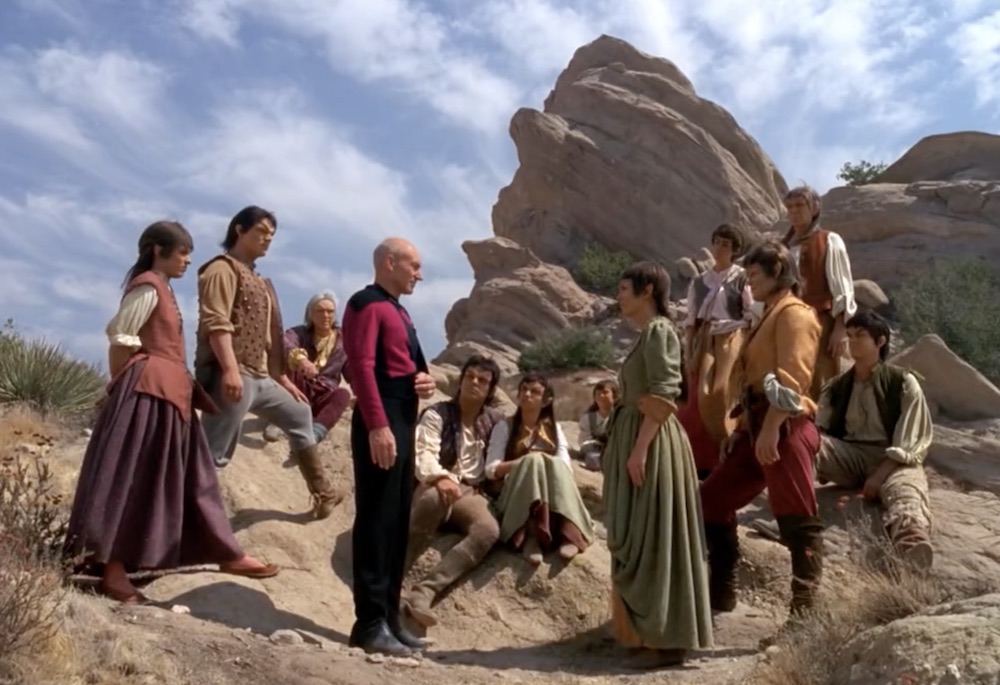
Dr. Crusher (Gates McFadden) attempts to revive Liko (Ray Wise), a Mintakan, by beaming him aboard the enterprise. Something goes wrong during the mind-wipe, and Liko remembers everything when they return. Liko deifies Picard (Patrick Stewart), while Picard and anthropologist, Dr Barron (James Greene) discuss solutions. Picard laments that any intervention risks laying down commandments, but that telling the truth might have the least consequences.
Eventually Picard does convince the Mintakans – by getting speared in the arm – but with a decidedly human ambition to become like The Federation someday. Though Religion in Star Trek seems to have been painted as the poison in this episode, colonialism is far more potent, a fact even the writers of this episode seemed to miss. Truly not a lesson learned. This was a 1989 episode, what about a decade later?
The Voth Doctrine of the Gaps
By 1997, the real issue isn’t so much faith-based belief nor organized religion in Star Trek: Voyager‘s (VOY) episode “Distant Origin”. The real issue is defining our identities in terms of a fixed belief. A fact made apparent by the technologically advanced and culturally narcissistic Voth. They are dinosaur ancestors that migrated from prehistoric Earth to the Delta Quadrant, but to them, this is merely dinosaur heresy (a pun based on this book).
Voth paleontologist, Forra Gegen (Henry Woronicz), discovers the lost remains of a Voyager crew member and uses them for genetic comparison. He and his colleagues find and board the Voyager while cloaked. They are discovered and a conflict ensues. Gegen captures first officer Chakotay (Robert Beltran) to use as evidence. The pair eventually agree to a more mutual situation. With Voyager in tow, they are forced to present their findings at a heresy trial by Voth leaders.
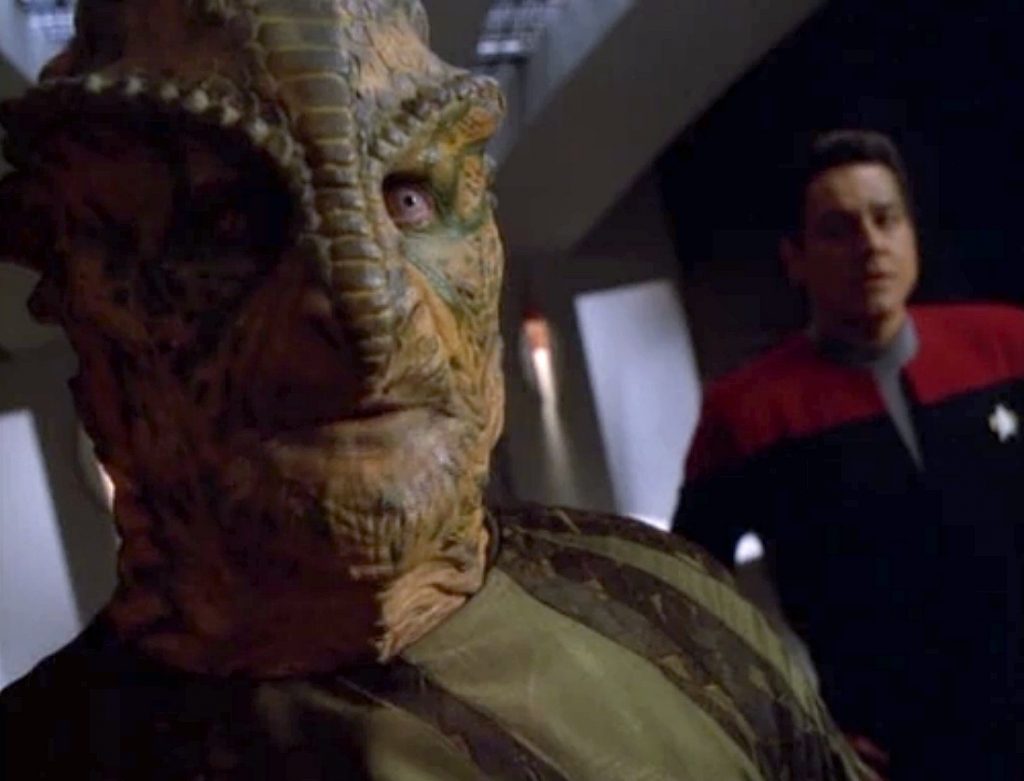
The Voth believe that all mammalian-like species are inferior. They believe that they evolved first in the Delta Quadrant. That they are powerful – more powerful technologically than The Federation. They believe their society will crumble if they accept a new reality. The Voth forces Gegen (from German “against”) to recant his ideas, even though they are compelling. Chakotay tells us that the weakness here is not faith but a failure to accept the past and thus to grow.
Bajoren Ethic & Spirit of the Prophets
Regarding faith in Star Trek, the evolution of these themes is presented in full force in the religion of Bajor and “The Prophets”. Dually rational and spiritually relevant, these themes deal with long narratives involving surviving colonialism as well as ego. Faith in Star Trek has gone from a one-dimensional critique to an involved integration into every facet of life which acknowledges gray areas like animatism. In DS9’s “Emissary”, the first episode of the series, we are presented with these juxtapositions.
We discover the Wormhole and its aliens, also known as “The Prophets”, who claim Commander Sisko (Avery Brooks) as their emissary. They possess knowledge beyond time due to the way they inhabit the universe. The Prophets are revealed to us as a loving, compassionate, yet strategic species in the episode “Images in the Sand”. And even tried to save the life of Jadzia Dax with a warning in “Tears of the Prophets”.
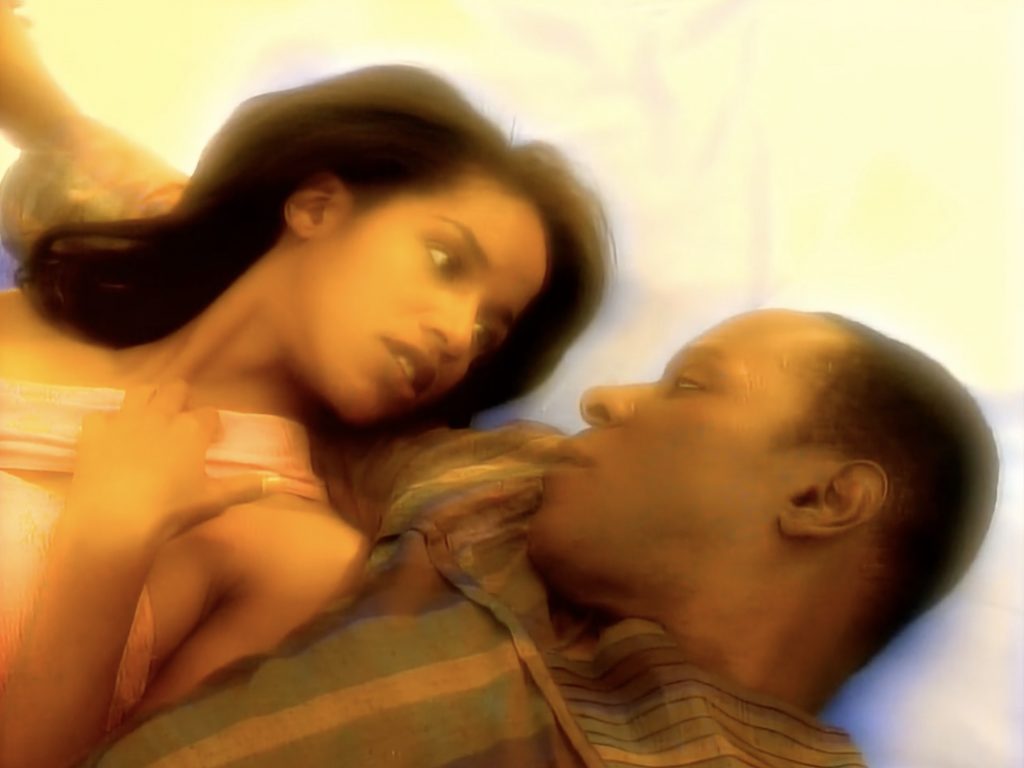
Sociopolitically this faith is not simple. Just as rationalism and spirituality are left in various states of resolution, so are struggles around decision-making, ego, and identity. Winn Adami (Louise Fletcher), variously Vedek (mid-level religious leader) to Kai (head theocrat) embodies this struggle as an ever-present foil to the sincere faith of Bajoran officer Kira Nerys (Nana Visitor) or the rationalism of Sisko.
“I’m a patient woman, but I have run out of patience. I will no longer serve gods who give me nothing in return.”
Winn Adami betrays herself and her people in DS9’s “Strange Bedfellows”
In the finale, “What You Leave Behind”, Winn has betrayed The Prophets. She does this for personal glory and secondarily the survival of Bajor. However, she realizes how her ego polluted her purpose and clouded her mind, leading to a change of heart that would be her last act.
Ultimately, when it comes to Religion in Star Trek, we cannot blame religion for the failings of our egos. A lesson that bears repeating in this day and age.
More From Trek Central
- 🚨 – FIRST LOOK At Star Trek: Section 31
- 🔥 – MULTIPLE Star Trek Movies In Development!
- 🔍️ – Klingons & Breen In Star Trek: Discovery Season 5?
Join the Star Trek conversation via our social media platforms:
- Facebook – https://www.facebook.com/TrekCentral
- Instagram – https://instagram.com/TrekCentral
- Twitter – https://twitter.com/TheTrekCentral
- YouTube – https://youtube.com/TheTrekCentral
- Mastodon – https://mastodon.social/@TrekCentral@universeodon.com
- Discord – https://discord.gg/fF2heMbfW8
